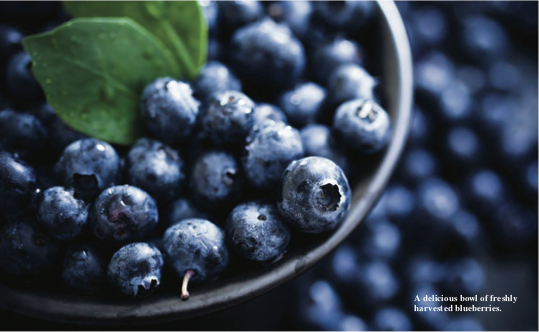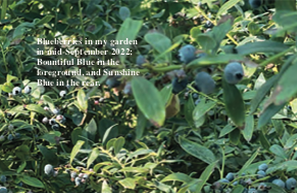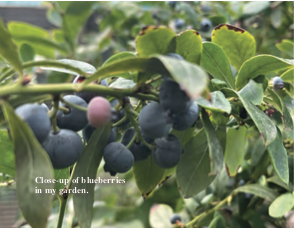Delicious and Nutritious Blueberries!

Photo: Alwaysyoucanstayfit
By Jay Davis
(This article originally appeared in the March/April edition of California Garden)
Blueberries are a wonderful, tasty treat that makes it fun to putter around in the garden, sampling as you go. Of all the plants I grow, these are my granddaughter’s absolute favorite!
Blueberries are also nutritious and high in anti-oxidants. A Tufts University study showed that they had the highest levels of antioxidants of the 41 fruits and vegetables tested.
Hybridizers have developed varieties of the Southern Highbush blueberry that do well in our Southern California climate, including Sunshine Blue, O’Neal, Misty, Marimba, Gulf Coast, Georgia Gem, Bountiful Blue, Jubilee, Suziblue, and others.

Jay Davis
I have Bountiful Blue and Jubilee, both of which are producing well. Bountiful Blue is more compact, with mine being about 3’ x 3’ after 5 years, and the Jubilee is approximately 4’ x 6’. The latter’s larger size, pushing past the comfortable confines of my raised bed’s cage, will force me to do pruning that is recommended, although, so far, I have avoided.
While blueberries can self-pollinate, most sources recommend planting more than one type to extend your harvest season. Various studies have also found that cross-pollination with different varieties can result in larger fruit and a greater fruit set.
Although several sources list the blueberry season in Southern California as ranging from May through July or August, at least in 2022 mine are still loaded into mid-September.
Blueberries like well-drained, acidic soil, in the range between pH 4.5-5.5. I added some peat moss to both my containers and the raised bed before planting. Periodically, I apply a balanced fertilizer for acid-loving plants as recommended. If your pH is higher, as is common for our generally alkaline soil, experts recommend the periodic application of sulfur. I also like to apply a light dressing of worm castings and home- made compost a couple times a year. I learned that when the leaves turn purple, it can be a sign that there is a phosphorous deficiency. This is a result of the pH being above 5.5 and the plants inability to uptake phosphorous. As a quick fix, you can add a couple of tablespoons of vinegar to a 2-3 gallon watering can when watering them, which is adding an acid to lower the pH. Blueberries prefer moist soil, so I have mine on a micro- spray with a timer.
Blueberries grow well in containers where it’s sometimes easier to manage those preferences than in the ground. I’d recommend at least a 5-gallon size, and of course larger if you can. I had them in 5-gallon containers for three to four years before transplanting them to a raised bed, not because they needed it but because we relandscaped our yard.
While mine were in containers I had them near a tree where they received filtered light. They still bore fruit; however, full sun is best and they will bear more heavily.
Blueberry plants seem to have few pests: the major ones for me are the giant whitefly along with the scale, aphids, and of course the ants that farmed them.

Jay Davis
I managed both the whiteflies and the sucking insects (aphids and scale) primarily with a hose attachment using the “flat” or “fan” setting, which puts out a relatively high-velocity, low-volume spray of water. Usually just a few brief sweeps knocked them off the plants. I was pleased and surprised that this also took care of most of the scale. However, had more than an acceptable level remained, I would have used horticultural oil as the next step. It really helps to check consistently because they keep coming back and it’s easy for them to take hold. For me, it’s often a see-saw battle when sometimes I’m ahead of the curve and other times behind it.
I try to keep the pesky ants out of the beds but they inevitably get in. There I use a boric-acid-based ant trap.
I’d encourage you to try to grow blueberries in your garden. They are attractive plants that provide tasty little treats that will bring a smile to your face, whether you’re sampling them yourself or sharing with friends and family.
Jay Davis has been a Master Gardener since 2010.

